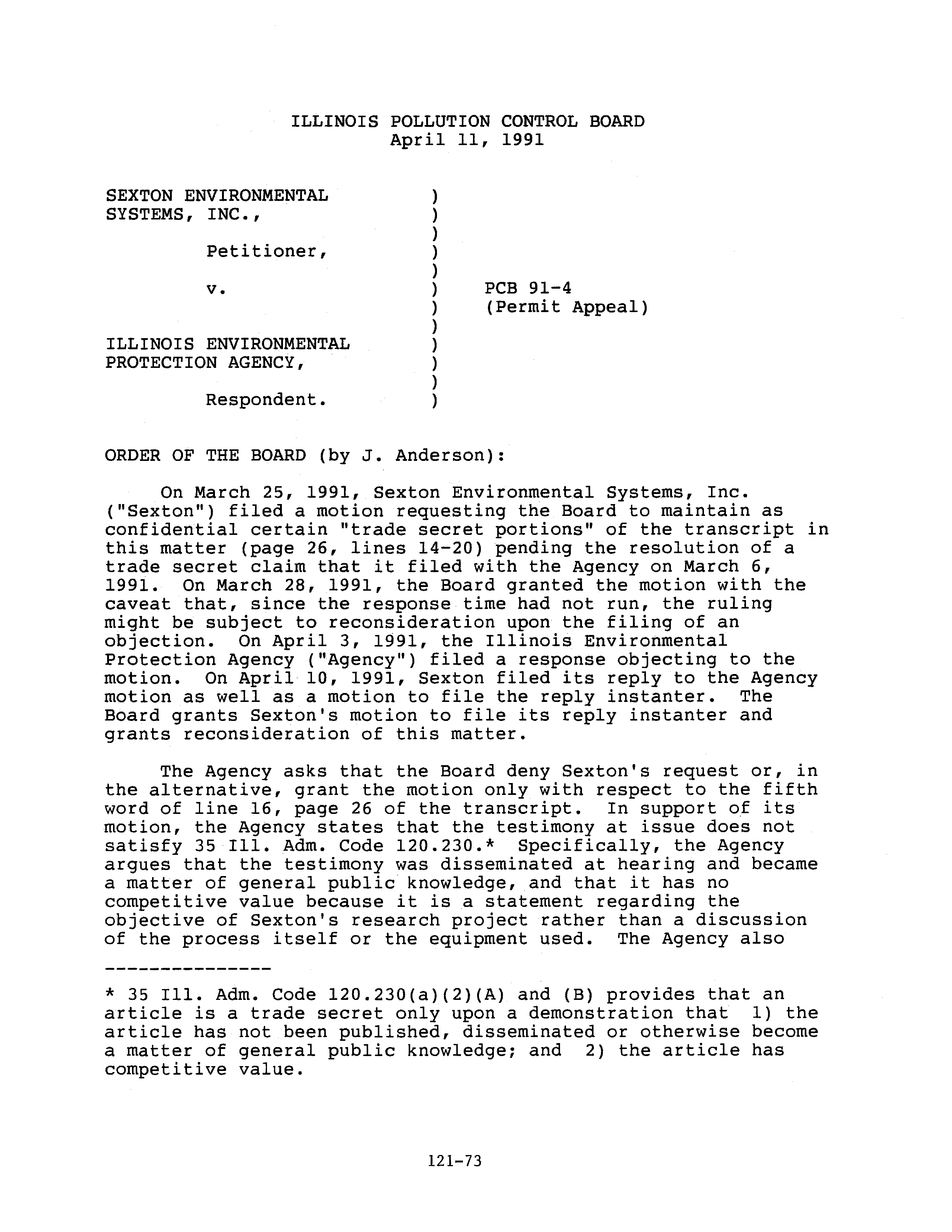ILLINOIS POLLUTION CONTROL BOARD
April 11, 1991
SEXTON ENVIRONMENTAL
)
SYSTEMS,
INC.,
)
Petitioner,
v.
)
PCB 91—4
)
(Permit Appeal)
ILLINOIS ENVIRONMENTAL
)
PROTECTION AGENCY,
)
Respondent.
ORDER OF THE BOARD
(by J. Anderson):
On March
25, 1991,
Sexton Environmental Systems,
Inc.
(“Sexton”)
filed a motion requesting the Board to maintain as
confidential certain “trade secret portions” of the transcript
in
this matter
(page
26, lines 14—20) pending the resolution of a
trade secret claim that
it filed with the Agency on March
6,
1991.
On March 28, 1991,
the Board granted the motion with the
caveat that, since the response time had not run, the ruling
might be subject to reconsideration upon the filing of an
objection.
On April
3, 191,
the Illinois Environmental
Protection Agency (“Agency”)
filed a response objecting to the
motion.
On April 10,
1991,
Sexton filed its reply to the Agency
motion as well as a motion to file the reply instanter.
The
Board grants Sexton’s motion to file its reply instanter and
grants reconsideration of this matter.
The Agency asks that the Board deny Sexton’s request or, in
the alternative, grant the motion only with respect to the fifth
word of line 16, page
26 of the transcript.
In support of its
motion,
the Agency states that the testimony at issue does not
satisfy 35
Ill. Adm. Code 120.230.*
Specifically, the Agency
argues that the testimony was disseminated at hearing and became
a matter of general public knowledge, and that it has no
competitive value because
it
is
s
statement regarding the
objective of Sexton’s research project rather than a discussion
of the process itself or the equipment used.
The Agency also
*
35 Ill. Adm. Code 120.230(a)(2)(A)
and
(B) provides that an
article
is a trade secret only upon a demonstration that
1) the
article has not been published, disseminated or otherwise become
a matter of general public knowledge; and
2)
the article has
competitive value.
121—73
—2—
argues that, assuming that the testimony was excluded, Sexton has
waived any right to contest the inclusion of the testimony in the
record when it did not object at hearing to the introduction of
the testimony.
The Agency next argues that the testimony
addresses the issue of whether the treatment process is a
recycling process, an issue that is central to the disposition of
the case, and that Sexton is attempting to exclude the testimony
because it
is damaging to Sexton’s case.
Finally,
the Agency
argues that the testimony has no competitive value because the
testimony at issue was read verbatim from page 86 of the Agency’s
Record and the transcript does not reflect a correct reading of
the material.
In its reply, Sexton disputes all of the Agency’s
assertions.
Sexton also notes that no members of the public were
present at the hearing.
On March
8, 1991,
the Board granted Sexton’s motion to
maintain the permit record
in this matter confidential pending a
decision by the Agency on Sexton’s March 6, 1991 trade secret
claim.
The testimony at issue
is part of Sexton’s permit
application and thus, part of the confidential permit record in
this matter.
We note that the Agency itself arguably became
entangled in this confidentiality issue when it asked Sexton’s
witness to read the material at issue verbatim from the permit
application.
In light of these
facts we hereby deny the Agency’s motion
and affirm our March 28,
1991 Order.
We are not ruling on the
question of whether the testimony actually constitutes a trade
secret.
We will continue to maintain the testimony confidential
until Sexton’s March
6,
1991 trade secret claim is resolved.
IT IS
SO ORDERED.
J. Theodore Meyer abstained.
I,
Dorothy M. Gunn,
Clerk of the Illinois Pollution Control
Board, hereby certify tha~the above Order was adopted on
the
/,fl2
day of
_____________,
1991,
by a vote of
________
~
Dorothy M.
G~4tin, Clerk
Illinois Pollution Control Board
121—74


